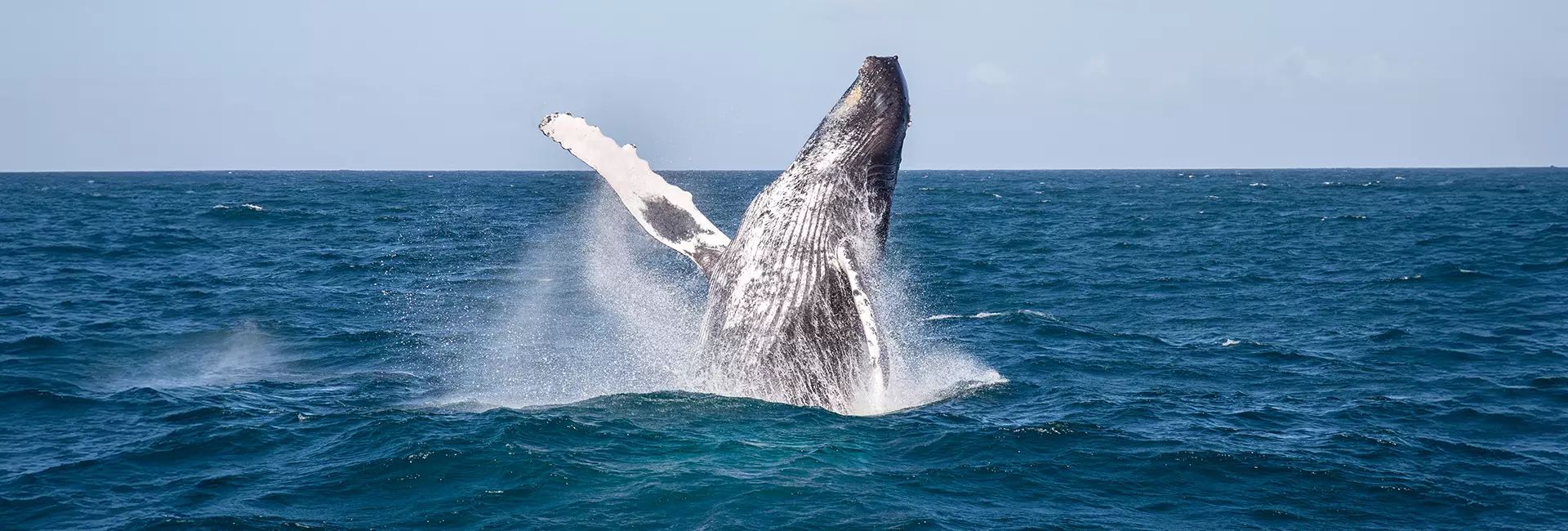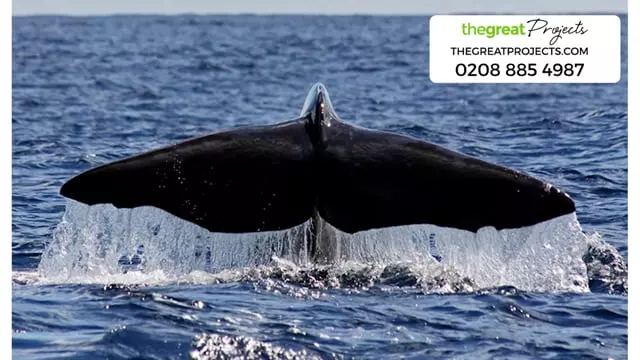
Whales
Volunteer With Whales
At the pinnacle of the ocean's food chain, whales are vital components of marine ecosystems, playing a crucial role in maintaining the ocean's delicate balance. Yet, not long ago, relentless commercial whaling drove many species to the edge of extinction. Thanks to global conservation efforts and a ban on large-scale commercial whaling, some populations have rebounded, but their survival remains under constant threat. Climate change, plastic and chemical pollution, entanglement in fishing gear, deadly ship collisions and more continue to endanger these marine marvels.
By volunteering with whales, you won't just witness their spectacular size and beauty; you'll become part of a movement fighting for their survival. Whether you're assisting in groundbreaking research, monitoring populations, or raising awareness about their plight, your contributions will have a lasting impact. By joining a whale volunteer program, you'll aid dedicated teams working to protect these ocean giants and ensure their song echoes through the seas for generations.

Projects Do More
6 - 55 Nights from $869.00
Help to assist a team of marine biologists in important whale and dolphin conservation.
View project13 - 83 Nights from $2,374.00
Work towards integral marine conservation in one of the most marine-rich locations on Earth.
View project15 - 85 Nights from $1,994.00
Experience real field research, coming face-to-face with a multitude of marine life while helping to protect a biodiverse marine paradise, including a coastal complex and wetland of international importance, home to The Bar Reef!
View projectOn the Blog
Whale Information
Whales At A Glance
Endangered Status
Dependent On Species
Number remaining in the wild
Dependent On Species
Endemic Region
Oceans Worldwide
The conservation status of whales varies by species. Some species are critically endangered, while others have stable or increasing populations thanks to conservation efforts.
Here are some of the most endangered species:
- North Atlantic Right Whale – Critically Endangered (~370 individuals left)
- North Pacific Right Whale - Endangered (fewer than 500 left)
- Vaquita (a small porpoise, but often grouped with whales) – Critically Endangered (fewer than 15 left)
- Blue Whale – Endangered (~10,000–25,000 left)
- Fin Whale – Vulnerable (~100,000 left)
- Sei Whale – Endangered (~50,000 left)
- Western Gray Whale - Endangered (~102-144 left)
Sadly, all species of whales face the same threats, including plastic and chemical pollution, ship strikes, entanglement and some hunting. As a volunteer with whales, you can be part of the solution, helping with research, rescue efforts, and conservation programs that protect these incredible creatures.
Whales face several significant threats, most of which are caused by human activities. Here are the biggest dangers they encounter:
- Climate Change: Rising ocean temperatures affect whale migration patterns and food availability, and ocean acidification impacts krill and other prey species, reducing food sources.
- Pollution: Whales sometimes ingest plastic pollution, leading to internal injuries and starvation. Chemical pollution, such as heavy metals, PCBs, and other toxins, accumulate in whale blubber, affecting health and reproduction. Additionally, oil spills contaminate their food and damage their skin and respiratory system.
- Ship Strikes: Large vessels frequently collide with whales, causing severe injuries or death, especially in busy shipping lanes.
Entanglement in Fishing Gear: Whales get trapped in fishing nets and lines, leading to drowning, starvation, or injuries that can cause long-term suffering. - Whaling & Hunting: Some countries (like Japan, Norway, and Iceland) still hunt whales for meat and other products despite global bans.
- Noise Pollution: Underwater noise from shipping, drilling, and military sonar disrupts whale communication, navigation, and feeding. Some species, like beaked whales, are particularly vulnerable to loud sonar, which can cause strandings.
- Habitat Destruction: Coastal development, oil drilling, and seabed mining disturb critical whale habitats.
- Declining Prey Availability: Overfishing reduces the number of krill, fish, and squid that whales rely on for food.
- Captivity & Exploitation: Though rare for large whales, orcas and belugas are still captured for entertainment, severely impacting their well-being. This has been severely reduced thanks to awareness campaigns.
One way to help combat these threats is to volunteer with whales through conservation programs.
You can help whales by reducing plastic use, choosing sustainable seafood, and supporting conservation groups like Whale and Dolphin Conservation (WDC) and Sea Shepherd. Avoid captive whale attractions, do not eat whale products if visiting countries such as Japan, Norway or Iceland, reduce ocean noise pollution by backing responsible tourism, and lower your carbon footprint to combat climate change. Volunteering with whales through marine conservation programs can make a direct impact. If you see a stranded whale, report it to marine rescue teams. Spreading awareness and advocating for stronger marine protections also make a big difference. Every small action adds up to protect these incredible creatures and their ocean home.
Whale volunteers assist in research, conservation, and educational programs. Typical tasks may include whale watching, data collection (e.g., sightings, behaviours), conducting surveys, assisting with beach cleanups, and participating in awareness campaigns aimed at preserving whale species.







